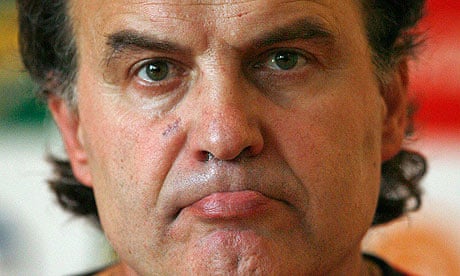The exchange was eloquent, a treatise on image and reality, the two faces of Marcelo Bielsa. It was played out at Estadio el Madrigal where Villarreal had just drawn 2-2 with Athletic Bilbao. Athletic's coach was addressing the media in his normal way – voice low, gaze lower – when he was asked about his odd touchline behaviour. Was it coincidence that after every Villarreal attack, he got up from his haunches and paced to the other side of his technical area, taking exactly 13 steps?
Bielsa did not look at his questioner. He never does. Staring down, he spoke in his usual slow monotone. "What is coincidence," he replied, "is that when there's such a nice game going on, someone spends time counting my paces."
They call the Argentinian El Loco and maybe they look too hard for madness. The way Athletic are playing, watching him not his team is absurd, yet it is hard not to be drawn to him. Bielsa is unusual, there is something addictive about his actions. Besides, person and professional are inseparable. The question is: is he really as mad as he is portrayed? "No," says the forward Iker Muniaín. "He is madder."
Bielsa arrived last summer and Athletic's players still have not completely worked him out. They have never seen anything like him and do not think they ever will. He is disconcerting, praising awful performances and bemoaning brilliant ones. Above all, he is intense. Compulsive. Obsessive. Mad. "He lives for football," the striker Fernando Llorente says. There are days, adds teh midfielder Javi Martínez, when he does not leave the Lezama training ground until the small hours. It is, he says, "insane".
When he arrived, Bielsa had watched their 38 league games last season, writing all the details on colour-coded spreadsheets. And that really is all the details – he says: "There are 36 different forms of communicating through a pass." He watches thousands of games, building a footballing taxonomy, like some kind of botanist. If a player does something new, he labels and stores it, learning from it. Teaching from it, too. Few are so didactic: he once drew on his shoes to show players exactly which part of their foot to use, wearing them for days after. Video sessions can last five hours and players joke that they do not dare make a mistake lest the green laser rest upon them and Bielsa demand a convincing explanation.
Training is intense, even when Bielsa takes children from the crowd and gets them to deliver instructions for him. Stopwatch in hand, he preaches high pressure, constantly interrupting and demonstrating. Gangs of players sprint from pole to pole, hunting as a coordinated pack, their errors revealed to them on a laptop. There is an almost childish wonder about Pep Guardiola's description of Athletic: "They all run up … and they all run down again. Up, down, up, down, up, down. They're fascinating."
All endeavour, no aesthetics? No. Bielsa, a former Argentina and Chile manager, has altered Athletic's historic identity as the most "English" of teams, teaching them in the words of one insider "not to be afraid of the ball any more". They have scored almost twice as many headers as any other team in Spain but where the ball used to be thumped into the area at the first opportunity, it is now being worked up the pitch. Only Madrid and Barcelona have completed more passes or scored more goals. "The style is totally different," says the defender Andoni Iraola; Llorente does the "opposite" of what he did before.
Synchronisation is fundamental, attacks automatic, movement mechanised, the pitch partitioned with tape, moves constructed and deconstructed piece by piece, passes made instantly. The circulation is constant. One exercise involves eight squares: two players cannot occupy the same space; if a team-mate enters your square, you vacate it. Crossing and shooting exercises, following specific, interchanging "passageways", do not end with the shot but with players sprinting back into their starting positions. Defence and attack are not separate.
"A man with new ideas is mad until he succeeds," Bielsa notes. Athletic did not win in their first five games as they struggled to assimilate new ideas; since then, they have lost only three of 21 and are one point from the Champions League places, their best finish for 13 years on the cards.
They are in the Copa del Rey final, seeking a first trophy in 28 years, and supporters are enjoying their football like never before. The sparkle in the eye of players, the sheer number of fans travelling to England – Old Trafford's highest ever away contingent – reveals what facing Manchester United means.
A few weeks ago, Bielsa was stopped by a group of kids who asked him to sign their sticker album. He said no, he had a better idea. He took the album off them and told them to meet him the following day, same place, same time. When he turned up 24 hours later, the entire team had signed the album. Not just any team: El Loco's team, the most exciting Athletic have had in three decades.

